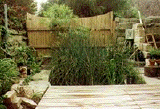If water is scarce, recycling becomes essential. Off-grid water is often sent through Reed bed water treatment systems — a series of artificially created ponds with reeds growing in them, through which waste water circulates. Even sewage can be treated this way as well as washing up water and shower water.

The water that flows out of a reed bed is clean and can be discharged straight back into a land drain, river or stream. Or it can be used for irrigation. Nothing’s lost, everything’s recycled: organic matter falls at the
bottom of the ponds or is eaten by bugs, and water is returned to nature. It first goes through a tank, where solids are filtered. The ponds are planted with reeds that release oxygen in the water and stimulate the growth of micro-organisms. It is these that clear the water of any soluble material and pollutants. No need for expensive and polluting chemicals.
For a good photo-based explanation of how to build a reed bed
Reed bed water systems provide a natural wildlife habitat and they look nice. They cost less in maintenance than conventional water treatment systems. The only problem is that you do need more land than for a conventional system.
Links
Johnston Smith are consulting engineers specialised in sewage treatment in the UK
The Henry Doubleday Research Association an organic organisation in the UK
An article from Permaculture International journal
WCI offer consultancy, design and installation of reed beds
UK company Cress Water Ltd specialises in reed bed design and installation
UK company Klargester also provides reed bed systems
One Response
Purifying waste water with plant technology
“Growing Clean Water” book by B. C. Wolverton, http://www.wolvertonenvironmental.com, http://www.oceanarks.org, http://www.waterstewards.org;
Purifying Polluted soil with plants
(phytoextraction of lead, arsenic and uranium from soil)
http://www.edenspace.com;